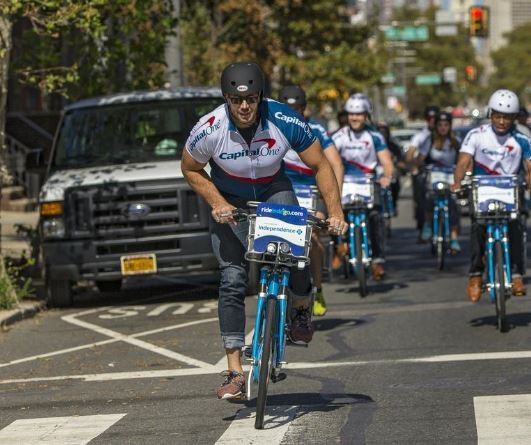City to consider bike share proposals; could launch program by 2019
Wednesday, July 26, 2017

(as reported in The Spokesman Review by Nicholas Deshais)
Visit nearly any American city and a bike awaits you.
Kiosks filled with bikes for rent populate the cores of New York, Boston, Minneapolis, Chicago, Portland and 113 other cities in the country. University towns such as Ann Arbor, Michigan, and Pullman, have bike share programs, as do the campuses of Yale, Ohio State, Purdue and Princeton universities. Smaller cities like Rapid City, South Dakota, and Clarksville, Tennessee, have them.
One place that doesn’t have the program? The 82nd largest urban area in the nation: Spokane.
That may change. The city of Spokane is looking into bringing a bike share program to town and has an $80,000 federal air quality grant to study and design such a system.
“I’m sure it’s coming,” said Brandon Blankenagel, a city engineer leading the effort. “It’s just a matter of how and when.”
Since 2015, Blankenagel and other city folks have been talking with multiple bike share vendors, many of which proposed offering their services to the city.
“We’ve had our feelers out for a little while. It wasn’t hard, because several companies had their feelers out looking for places to invest,” Blankenagel said. “They’d say, ‘What’s your plan? You’re a good-sized city. Where’s your bike share?’ ”
Last week, Blankenagel pulled together a meeting of other groups interested in the program, including the Washington State Department of Transportation, Gonzaga University, the University District, Spokane Transit Authority, Spokane Regional Transportation Council, local governments and others. The next step is hiring a transportation consultant experienced in bike share programs to design Spokane’s system, paid for by the federal grant.
Part of the design will identify sponsors for the program, both for advertising and location.
“We won’t be using grant funds. It will be a locally funded program,” Blankenagel said. “In all likelihood, the city of Spokane will be sponsor of a location, or two, in Riverfront Park. And it totally makes sense for Kendall Yards and others to sponsor this.”
Blankenagel said a program could be in place as early as 2019, with an initial offering of up to 60 bikes.
On average, bike share programs are affordable, with a 10-bike kiosk costing about $9,000. Bikes can be free for the first 30 minutes or a couple of dollars for the day, but rental schemes vary from city to city. Between 2010 and 2016, 88 million trips were taken on bike share bikes nationwide.
At the city’s Public Works Committee meeting this week, Spokane City Councilwoman Lori Kinnear said she was concerned about a drop-off in ridership due to Spokane’s “four seasons.”
“Because casual riders don’t generally ride bikes in winter, does that present another set of problems?” Kinnear said.
Blankenagel said bike share systems have worked in “all climates,” but noted that Spokane’s helmet law and prohibition of riding on the sidewalk present larger difficulties for the program. Laws requiring helmets for all riders and bike share programs exist in other cities just fine, Blankenagel said, but are “clunky” and “not as spontaneous” for potential riders.
“There’s data out there that says the nature of bike share trips are safer. The reality is these aren’t fast bikes,” Blankenagel said. “One solution is you may repeal the (helmet) law.”
But it may not be that simple. Seattle’s bike share system was shut down earlier this year, with some blaming the city’s helmet law for its failure, including Janette Sadik-Khan, the former New York City Department of Transportation commissioner. Others, like the Seattle Transit Blog, said its demise was more complicated and pointed to issues with the management and design of the system.
New York legislators are considering a new helmet law for New York City, prompting worries that it could hurt the city’s popular Citi Bike program, which has more than 10,000 bikes all over the city. The company points out that 43 million rides have been taken on their bikes, and only 50 incidents have occurred requiring medical attention.
Riding on the sidewalk is another issue that can be dealt with through rider education at the kiosk and enforcement practices.
As for naysayers who point to the ill-fated lilac bikes in Spokane a generation ago, the differences between then and now are many. Fifty rehabilitated, one-speed purple bikes appeared in June 1997, slapped with friendly stickers asking users to be so kind as to leave them in places where other users could find and ride them for free. The program lasted about a month, after most of the bikes simply disappeared or were found washed up on the shores of the Spokane River.
Blankenagel dismisses the comparison.
“When bike share was just a rogue setup, it didn’t work. That’s not just true here, it was true everywhere,” he said, predicting the new professionalized program will succeed in the Lilac City. “It’s neat to see it coming to Spokane. It’s been shown to work in all sizes of cities and climates.”
Photo caption: Pro linebacker Connor Barwin takes a spin with local fans to celebrate Capital Ones new sponsorship of Indego, the bike share program in Philadelphia. Spokane is considering bringing bike share to town. (Al Tielemans / AP Images for Capital One)